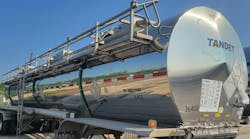Liquid CONcept, Hamburg, Germany, has been awarded the International Featured Standard Logistics (IFS-Logistics 2.1) certificate from the DEKRA testing organization for the first time. The IFS guarantees transparency along the entire supply chain by performing tests based on a globally uniform rating system. Liquid CONcept meets the requirements for the loading and unloading, storage, and transportation of liquid foodstuffs as well as for quality management.
The certificate likewise covers intermediate bulk container logistics. Liquid CONcept is therefore the first company to receive IFS certification for small container transportation services.
“Our customers from the foodstuffs industry place top priority on continuous process safety,” says Ulrich Schnoor, managing director of Liquid CONcept GmbH & Co KG. “The IFS certificate confirms our high quality standards for logistics services for foodstuffs and reinforces the trust that customers have in us.”
In addition to the requirements for quality management stipulated by the ISO 9001 standard, the checklist of the IFS audit encompasses nearly 100 testing factors, including risk and hygiene management based on HACCP (Hazard Analysis and Critical Control Points). Upon successful completion of the audit, adherence is monitored annually by an accredited certification body.
For the liquid logistics company, the adherence to standards according to IFS, as well as monitoring through independent bodies, is highly important. Product safety, quality, and transparency are the decisive factors for the transportation and storage of foodstuffs. The IFS-Logistics 2.1 certificate covers all modes of transportation and all food-based products, regardless of the temperature at which they are transported.
The standards of the IFS Logistics cover the minimization of risks related to foodstuffs and increased transparency, thus ensuring deeper customer trust. Thanks to the effective monitoring of processes, it serves as proof of foodstuff safety and product liability.








